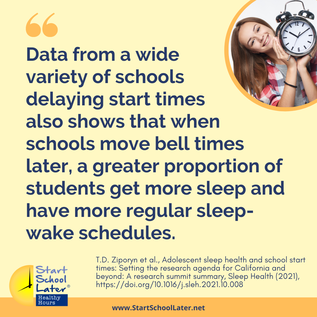Starting School Later Improves Teen Physical and Mental Health, Safety, and School Performance1/18/2022 Starting School Later Improves Teen Physical and Mental Health, Safety, and School PerformanceResearch Summit Provides Roadmap to Ensuring Sleep-Friendly School Hours Across the Nation (Severna Park, MD) Most U.S. schools should — and can — start later in the morning. That’s the conclusion of a virtual research summit held at Stanford University, organized in response to California’s “healthy school start time” law (SB328) scheduled for implementation later this year and co-sponsored by the non-profit Start School Later (SSL) and the California PTA. A new paper summarizing the summit findings is available online and will be published in the February edition of Sleep Health, the National Sleep Foundation’s peer-reviewed journal. The California law requires most public secondary schools in the state to protect adolescent sleep health by starting high schools no earlier than 8:30 a.m. and middle schools no earlier than 8 a.m. In recent years, over a dozen other state legislatures have considered legislation regarding school start times, including several currently considering bills similar to California’s. Recognizing this unique opportunity as California rolls out the new law, Start School Later spearheaded an effort to convene experts from a wide variety of disciplines to identify interdisciplinary research opportunities. By reviewing decades-worth of multidisciplinary research on adolescent sleep health and school start times in areas as diverse as health and education policy, juvenile justice, academic performance, health equity, and physical and mental wellbeing, the resulting summit created a roadmap to building on existing research and turning it into school policy. Click here to watch a recorded discussion of the Summit outcomes with Stanford’s Dr. Raphael Pelayo and other Summit participants. “The statewide implementation of later school start times in 2022 opens up exciting new research opportunities that can help communities across the U.S. and beyond ensure school hours that give all students a chance to get healthy sleep while reducing disparities," said Terra Ziporyn, PhD, the paper’s lead author and Start School Later’s Executive Director. “We don’t need more research to show that later school start times are necessary and feasible. We need research that will give communities the tools to make it happen.”
The summit, hosted by the Department of Psychiatry and Behavioral Medicine at the Stanford University School of Medicine and supported by the National Sleep Foundation and American Academy of Sleep Medicine, included participants from a wide range of academic backgrounds, including sleep and circadian biology, neuroscience, education, medicine, public health, mental health, safety, public policy, economics, implementation science, criminology, diversity studies, and science communication. Their conclusions support position statements from the National Sleep Foundation, American Academy of Sleep Medicine, American Academy of Pediatrics, American Medical Association, CDC and dozens of other respected scientific, health and education organizations recommending that middle and high schools start no earlier than 8:30 a.m. Biological changes during adolescence advance teenagers’ circadian clock by 2-3 hours, making it difficult for most teens to fall asleep or wake as early as younger children or older adults. Waking at 5:00 or 6:00 a.m. for classes that start as early as 7:00 a.m. makes it nearly impossible for most teenagers to get enough sleep (most need about 9-9.5 hours per night) and requires waking during a critical part of the sleep cycle. Many studies show that when school starts later, students get more sleep, contributing to better physical and mental health, less substance abuse, safer driving, and improved attendance, academic performance, and graduation rates. These improvements are even more pronounced for disadvantaged students, suggesting that later school start times may be a mechanism for reducing the opportunity gap. “The verdict is in: starting school at times that let teenagers have a chance to get healthy sleep is essential – and realistic,'' said Dr. Ziporyn. “The systemic changes made almost overnight during the COVID-19 pandemic – including revised start times – prove that for matters of public health, school systems have much more flexibility than previously imagined.” Co-authors of the Sleep Health paper summarizing summit findings include several members of the Start School Later Board of Directors, Advisory Board, and National Team: Terra Ziporyn, PhD; Judith Owens, MD; Amy Wolfson, PhD; Rafael Pelayo, MD; and Phyllis Payne, MPH. # # # Start School Later is a 501(c)(3) non-profit organization founded in 2011 to ensure school start times compatible with health, safety, education, and equity. Visit www.StartSchoolLater.net.
1 Comment
|

 RSS Feed
RSS Feed